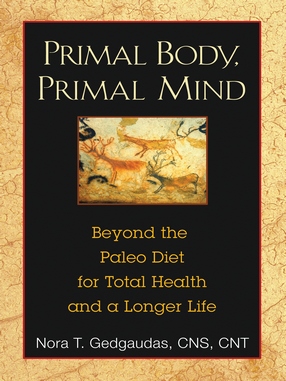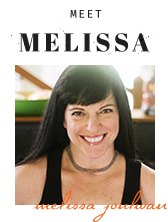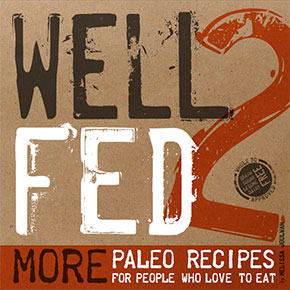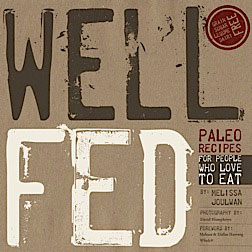Welcome to the first virtual meeting of our book club and our discussion of Primal Body, Primal Mind by Nora Gedgaudas! (If you don't know...
Read MorePrimal Body, Primal Mind: Q&A #3
Welcome to the final virtual meeting of our book club and our discussion of Primal Body, Primal Mind by Nora Gedgaudas! (If you don’t know what’s going on around here, read this post…or read the first Q&A.) If you’re new here, you’re welcome to join us! Just get a copy of Primal Body, Primal Mind and chime in on the discussion anytime!
Book Club Meetings
Chapters 1-9 – Monday, August 29 – Read the Q&A
Chapters 10-23 – Monday, September 19 – Read the Q&A
Chapters 24-31– Friday, September 30– DONE!
Just like previous meetings, I’ll ask a few questions to get things started. Take a look at the questions below and share your thoughts in comments. Don’t feel pressure to answer all the questions… you can just respond to the ones that inspire you. Or blast us with all of your thoughts, if you’re really feelin’ it.
1. Chapter 24 opens with the idea that there is “no fundamental separate between mind and body.” Discuss.
2. Not a question: Hahahahah… we’re all fatheads! “The brain is made up of more than 50 percent fat…” (p. 232)
3. The sections on memory and stress in Chapters 26 and 29 really hit home. Now that my diet, training, and sleep are well on track, stress is my next stumbling block. I’ve decided to do a 15-20 minute meditation every other day while I’m on my trip to Prague. What are you doing to manage your stress?
4. In Chapter 27, I had a very physical reaction to this quote: “… any emotional state you can think of also corresponds to a certain type of body language.” I’ve experienced that myself. If I walk tall and slap a smile on your face, and eventually you will feel more positive and confident. When I put on “fat clothes” and shuffle around like a troll, I feel lousy. How about you – do you feel a connection between your mood and body language?
5. Also not a question, but I agree with this: “I personally would almost rather deal with being chased by a saber-toothed tiger or a charger cantankerous woolly mammoth than deal with the corruptive influence of the FDA and multinational corporations or face massively contaminated food, water, and air supplies.” (p. 284)
6. You know I’m a strong proponent of the Whole30 and elimination diets, so the detoxification recommended in chapter 30 is great. However, I don’t like the guideline that allows “a little stevia.” How do you feel about that?
7. I don’t have any questions related to Chapter 31 – I just think it’s a solid recitation of what we know to be true: we need to eat real food and minimize the stress of modern life. Do you have anything, emotional or intellectual, you’d like to share on that topic?
8. Appendix A lists 19 steps we can take “toward improved physical and mental health and well-being.” How many of them have you adopted? (I’m good for all of them except #9 (I take Vitamin D, but not cod liver oil); #14 (I have no idea where the high-tension power lines and Wi-Fi routers are in my life.).
Before we hit the discussion, I want to say that I think Nora’s sleep recommendations are too low (7-8 hours per night); I strive for a minimum of 8 and I’m thrilled if I get between 8 and 9. And, honestly, I’m still really struggling with the idea of eating less protein. I’m going to re-read those parts of the book and consider a self-experiment in November/December, but I’m not convinced I’ll feel like optimal me if I cut back on protein.
To end on an up beat: I love the extensive resources and reading list in the back, and Nora is bursting with vitality and good health in that photo on page 377. I certainly can’t argue with that!
You’re turn – sound off in comments!
More Like This...
I'm delighted that so many of you were inspired by my post about Nora Gedgaudas's presentation at the AHS last week. Our online book club...
Read More






Q1 and 2 as I only up to chapter 27.
I would agree that is my experience that as I have got older intuition is the best decision making tool rather than thinking it through.to do that though I really need to be without stress.I have found the Sedona method really helpful especially in the moment of choice whether to be upset or let it go.
I have found meditation helpful but tend not to place enough importance on it.
As a teacher of Low Stress Stockmanship I have experienced animals health be affected just by the emotions of the people working them.a simple kinesiology test can show how a thought will weaken or strengthen the body.
Feeling great will change your day and I find that even when I don,t , when someone says how are you I answer fantastic, so now I told myself and another so what choice does my body have but to catch up to my created reality .
I shall read on.
Wow I finished the book and look forward to hosting Nora on a Teleseminar next week.
You can join in or get the recording free by going to http://klrtelecall.blogspot.com/ and securing a spot.
1. Chapter 24 opens with the idea that there is “no fundamental separate between mind and body.” Discuss.
I don’t think there’s much to discuss! My educational background is in psychology and biology and this is plainly clear.
3. The sections on memory and stress in Chapters 26 and 29 really hit home. What are you doing to manage your stress?
Stress management has become a big issue for me. In the last three years I’ve experienced my rite of passage into the real world (I graduated), the death of both my parents, and two thousand-plus-mile moves across the country for two new job opportunities (my first ever full-time jobs). At the time I took that all like it was just normal and I was doing fine and this is what happens to people when they’re growing up. And then I wondered why I was stressed out and blowing up all the time lately. I haven’t been dealing with stress — I’ve been ignoring it. So the first step has been admitting that I’m stressed at all and admitting that I can’t handle things all by myself.
4. In Chapter 27, I had a very physical reaction to this quote: How about you – do you feel a connection between your mood and body language?
This is the James-Lange theory of emotion: http://en.wikipedia.org/wiki/James%E2%80%93Lange_theory and I like it. I think William James was a visionary. I keep his books on my shelf and I’m always learning from him.
5. Also not a question, but I agree with this: “I personally would almost rather deal with being chased by a saber-toothed tiger or a charger cantankerous woolly mammoth than deal with the corruptive influence of the FDA and multinational corporations or face massively contaminated food, water, and air supplies.” (p. 284)
The corruption of things is really messing with me lately. Every now and then I need to tune out from society for a bit so I don’t go crazy. I do my part at home and on a local level and I support those working on a broader scale to put into effect the changes I want to see in the world. I need to remember to stay calm and not get all caught up in the big picture because really, we’re doomed and we’ve always been doomed. Let’s just go with that and then anything our efforts produce will be amazing and worthwhile. We’re not entitled to anything as a species and we’re going to have to work together for anything we want.
6. You know I’m a strong proponent of the Whole30 and elimination diets, so the detoxification recommended in chapter 30 is great. However, I don’t like the guideline that allows “a little stevia.” How do you feel about that?
I think it depends on your philosophy. Sweeteners aren’t allowed on the Whole30 because it’s not just about detoxification — it’s also about breaking bad food habits. I’m not sure Nora gives much guidance on how to do that sort of emotional endeavor that beyond science basics (take some glutamine, etc.). Similarly, I think the stevia comes from that same philosophy. If you don’t think it’s harmful, why abstain from it? She’d probably modify her recommendation for someone who was having trouble breaking the sweets addiction cycle.
7. I don’t have any questions related to Chapter 31 – I just think it’s a solid recitation of what we know to be true: we need to eat real food and minimize the stress of modern life. Do you have anything, emotional or intellectual, you’d like to share on that topic?
I would love to eat more raw animal products! I love sashimi so much, but it’s expensive. I already only barely cook my beef (and eat well-sourced meat) but I might look into how to eat more raw beef in interesting ways.
8. Appendix A lists 19 steps we can take “toward improved physical and mental health and well-being.” How many of them have you adopted?
I’m not supplementing omega-3. I’m still conflicted about all the evidence. I do eat a fair amount of sardines and other oily fish, and I’ve pretty much eliminated omega-6.
I also don’t supplement with cod liver oil. I take vitamin D but I eat a lot of beef liver so I’m not sure I need supplemental vitamin A. I’ll have to look into it.
I’ve only recently started supplementing with zinc and magnesium.
Also – about the protein restriction thing. I think this sort of falls into the way Robb Wolf talks about health, longevity, and performance being on different axes that oppose each other in some respects. Nora’s talking about restricting protein and carbohydrates in order to increase longevity. If you’re interested in optimal health in the moment and performance in your athletic endeavors, limiting protein might NOT make you feel well. But you won’t know until you try, I suppose!
I followed a strict moderate-protein low-carb ketogenic diet for about a month to see if it would alleviate some mood issues, but it didn’t. I know a month’s not long, so I intend to try again (after a party next weekend — I heard rumors of bacon-wrapped figs) with some better supplementation. Also, I’m keeping an open mind about dietary choices and I read a lot of what other people in the paleosphere have to say. Interesting times, to be sure.
Brand new, but I’m going to jump in . . .
What are you doing to manage your stress? I do daily meditation and yoga. I acknowledge my emotions, but try not to let them rule me. I do rebounder and skin brushing daily too.
6. “a little stevia.” How do you feel about that? I’m happy about it. I use less than 1/8 tsp a day split between my herb tea and my Greek yogurt. It is the only sweetener I use, so I feel pretty good about it.
8. Appendix A lists 19 steps: I’m doing well on all but the following:
#4–I need to get the salt next time I am out.
#8 — I just added fish oil this week. #12 — I’m still trying to incorporate all I learned from this book, so I’m not quite ready to start a lot more reading.
#14 — We don’t have a router, but do have cell phones. We are on the very edge of the coverage area, so no tower near here. We don’t use electricity in the bedroom at all. I need to cut back my phone time, computer time, and buy a corded phone.
#19 — As a recovering vegan I have no problem with 50% of my veggies raw, but meat, um . .. so NOT ready to go there.
1. I mind-body connection is apparent. Just ask a hypochondriac.
3. I’m going to start taking regular yoga classes. My job can be physically and mentally stressful at times so there is really no way to avoid it. I’ve quit drinking because that wasn’t doing me any good.
4. I wear high heals as often as possible because the way I walk when I wear them makes me feel more confident.
5. Yes. Seems like a better, cleaner world. I am always looking for article on GMOs and Monsanto to share with my friends to educate and make people aware that the food supply has been irreversibly poisoned. I feel like I’m preaching to the choir however because the only ones who want to listen are the ones who are already aware. It seems like this goes beyond corporate greed. They have created a fat, lazy population, addicted to sugar and dependent on pharmaceuticals to maintain their moods, relieve their pain and control their failing bodily functions. Did we really need cows that produce more milk, chickens who lay more eggs or USDA subsidized cornfields to produce more corn when we already had a wasteful food surplus in this country?
I’ve never hunted before and I’m going to ask a friend to teach me. Besides, chasing or being chased and surviving seems like fun.
6. Stevia – I use it. I know I shouldn’t. I read once that it didn’t effect insulin like other natural and artificial sweeteners, but didn’t think that could be true since it is the sweet taste that triggers production. I’m having a hard time giving it up completely and only use a pure stevia product. I also use flavored balsamic vinegars in my cooking and they also have a sweet taste. I’ve also noticed that when I add lemon juice to fresh shredded coconut it tastes really sweet to me. I’ve become more sensitive to sweet tastes and I wonder if that’s a good thing or a bad thing with regards to triggering insulin.
7. Eat real food, then go to a party and feel stressed because have to explain to your friend why you won’t drink beer or eat the kielbasa he covered in BBQ sauce and have to deal with people telling you you don’t have to diet because you’re already skinny. No one gets that it’s not about “being skinny”, it’s about being well.
8. Most of these things, I haad laready been doing.
#2 – I’ve cut back on carbs. I previously eating 3 servings of fruit a day and alcohol on weekends. I’ve cut both of those out.
#4 – I stared using Himalayan salt.
#14 – can’t do. I don’t use bluetooth and hardly talk on the phone, and I do spend a great deal of time in the middle of nowhere, but I also use technology that may increase my exposure to EMF pollution a couple of days a week. Plus, I need my iHome alarm clock because nothing wakes me up better than the dulcet sounds of Slayer and Otep.
#19. I would love to eat more raw food. I like my steaks Pittsburgh style. I’m going to see if I can make my own kimchi one day.
Regarding just the lower protein recommendations. I tried to implement them after reading the first edition of this book, and I just couldn’t handle the large amount of fat that would be required to make up the calories.
However, now I eat a lot more carbs (I was encouraged to increase them even further when it was discovered I’m hypothyroid) and Kurt Harris has been mentioning he now thinks healthy individuals could get up to 50% of their calories from starchy tubers safely. (He used to eat and advocate VLC).
So if I try eating a smaller portion of meat, adding in delicious veggies for flavor & variety, then filling up with some starchy sweet potatoes, etc, maybe I could find a sweet spot.